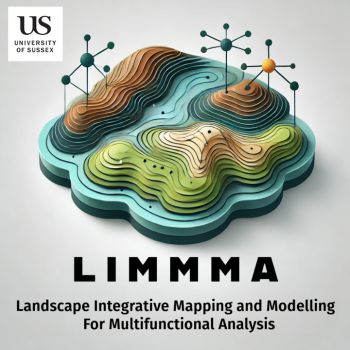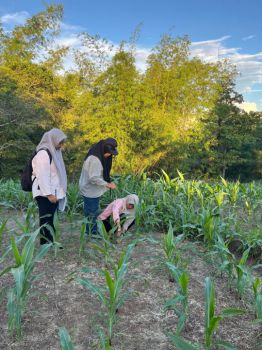Sustainable Multifunctional Landscapes Research Programme
Posted on behalf of: Fiona Marshall
Last updated: Thursday, 6 November 2025


Sustainable Multifunctional Landscapes is a transdisciplinary programme of research that explores pathways to sustainable land use, working to support policy and planning processes and on practical interventions to improve local nature recovery, food security and the health and livelihoods of agricultural communities.
LIMMMA: Applied Modelling, Policy Collaboration & Government Advice
The LIMMMA Platform, (Landscape Integrative Mapping and Modelling for Multifunctional Analysis), supports this programme of work. It was Initiated in 2017 at the University of Sussex and its development, and range of applications continues to evolve. It demonstrates a strong track record of expert policy-oriented research, national government collaboration, and expert advice across national and regional levels.
Funding, Timeline & Government Pilot Programme Involvement
-
LIMMMA began as a collaboration between SPRU (Science Policy Research Unit) and the Predictive Analytics Lab (Informatics) at Sussex.
-
Its first proof of concept phase was funded by Sussex’s Sustainability Research Programme (SSRP).
-
It was then central to a Sussex led project ‘Inclusive Green Infrastructures of Urban well-being ‘ funded by the British Academy (2019-2022) which aimed to support the integration of formal and informal green infrastructure into city region planning to improve the health and livelihoods of citizens in inclusive ways. This work was based on case studies in Indian and China (in partnership with Jawaharlal Nehru University and Zhongnan University working with local communities and environmental groups and in consultation with government officials and planning agencies)
-
Subsequently, in 2023, LIMMMA was developed as a component of the £12.5 million Nature-based Solutions pilot programme. Nature-based solutions (NbS) for climate change have the advantage of tackling climate change at the same time as supporting biodiversity and providing a wide range of benefits to people, ranging from natural flood management to opportunities for recreation. A Defra - BEIS project supported by the Treasury’s Shared Outcomes Fund and led by Natural England, Environment Agency, RBG Kew and the Forestry Commission will tackle these challenges. In that programme, LIMMMA (via the Sussex team) was linked to landscape-scale modelling and carbon / biodiversity monitoring together with Kew, contributing evidence to government biodiversity and land restoration policy.
-
Within the Natural England scheme, Sussex contributes to the design of modelling tools, data integration, and supporting evidence generation for government efforts to incorporate nature-based solutions into land management and climate policy.
Policy-Focused Research & Expert Advice to Governments
-
LIMMMA is explicitly designed to support evidence use, comparative analysis, and decision support for land-use policy in diverse national and regional contexts, making modelling and scenario tools accessible to policy actors (both specialist and non-specialist).
-
The platform enables government departments, planning agencies, or nature recovery bodies to visualise and interrogate land use models, compare outputs, explore uncertainties, and integrate local datasets for Local Nature Recovery Plans. This supports informed policy dialogues, scenario planning, and land management strategy development.
-
As part of the Natural England pilot, Sussex works with governmental bodies and local partners to apply modelling tools in real pilot areas (e.g. Wakehurst in Sussex), producing evidence that feeds directly into landscape governance, nature recovery planning, and carbon sequestration policy at the local/regional scale. This integration of funding, project design, government partnership, and accessible modelling tools underscores Sussex’s direct role in translating scientific research into policy advice and decision support for government actors in climate adaptation, land management, and nature-based solutions.
This ongoing global commitment is further demonstrated by LEAF Indonesia, lead by Sussex in partnership with Monash Indonesia, Gorontalo University, University of Papua, Mulawarman University and other local organisations. It works with Indonesian farming communities, NGOs (such as Bapesta and Biota – working in the field of conservation and biodiversity), and government agencies in Kalimantan, Gorontalo, and Papua. Funded by the Global Centre on Biodiversity for Climate (GCBC) through UK Official Development Assistance, LEAF Indonesia is working toward the co-development of land-use scenarios with regional policy-makers to balance biodiversity conservation, food security, and climate resilience.
This participatory, evidence-based approach builds local capacity while informing strategies at higher governance levels, highlighting Sussex’s contribution to developing international best practice on climate and land management through collaboration with governments, NGOs and communities. At a community level the project works directly with farmers on educational and outreach programmes to support, connect and scale up sustainable land use practices. Other educational activities include a living lab project co-created with 200 students at Gorontalo University with practical demonstration and monitoring and evaluation of of sustainable agricultural land use practices, diversification of agricultural products and marketing channels.

